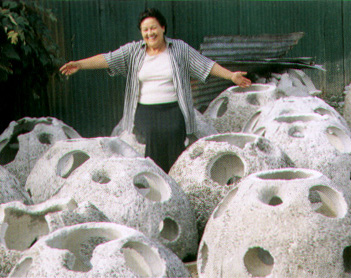 |
|
May 2001, Volume 12, Number
5
Spheres of
Influences!
 An Opotiki trust is testing a way to combine employment
creation with sustainable kaimoana resources... An Opotiki trust is testing a way to combine employment
creation with sustainable kaimoana resources...
Te Whakatohea Trust Board's training unit has
launched Project Kaimoana - a multi-pronged initiative involving
aqaculture and fishing training, constructing artificial reefs
(using reefballs), monitoring species development within reefs,
working with hapu and schools, and looking at future opportunities
such as taking diving trips to the reefs and speciality
aquaculture.
Training unit manager Christina Rolleston (pictured
above with the newly constructed reefballs) says the organisation is
getting involved in aquaculture because of its coastal marin
environment.
Set up in 1989, the unit has run various
projects and courses from hospitality to horticulture, computer
skills, Maori arts and crafts, Te reo and raranga.
When
looking at the aquaculture concept, which has received support and
advice from the Community Employment Group, Christina was keen to
move forward in an innovative way: "We must stretch our minds and
imaginations and see the world as our oystrer. Living in rural areas
can limit what young people aspire to if they just think from one
river to the next."
The organisation cama cross the reefball
concept through :looking at the internet and subscribing to
different publications."
The concept involves constructing
artificial concrete reefs that “mimic nature.” They are placed at
sea to create new environments for marine life, and have been tested
around the world in over 400 locations including the Philippines,
Brazil, Mexico, Australia and the United States.
Participants
on the Project Kaimoana aquaculture and fishing course have
researched the benefits and possible pitfalls of the reefballs, as
well as constructing 30 of them as part of their course. They have
spent time observing pipi beds with scientists so that they will
have the skills to monitor what happens when their artificial reefs
are installed.
CEG fieldworker Hera Katipa says it is hoped
the reefballs will contribute to enhancing the fish population as
well as paua, kina, mussels and pipi, and provide the groundwork for
new aquaculture enterprises to be established. “They may create more
accessible fishing areas and encourage some species that
traditionally just passed through to stay.”
Course
participants hope that their pilot project will provide jobs,
education and enhance local hapu and iwi development.
The group
has resource consent to launch 30 of the reefballs at three
different depths -- to attract different species.
“We will be
monitoring them very carefully,” says Christina.
Students have
undertaken diving, monitoring and underwater photography training to
enable this to take place.
The next stage for the group is to
launch the reefballs and begin monitoring any environmental impact.
Reports to hapu will include sustainable harvest suggestions and
ongoing consultation.
Successive deployment of reefballs could
eventually create an extensive, interrelating reef supporting many
species.
The eco-friendly reefball concept was developed in
the United States by a group wanting to help restore and protect the
world’s ocean ecosystems. Human activity and natural disasters have
reduced natural reef systems throughout the world, while growth in
fishing, scuba diving and boating has increased pressure on the
remaining reefs. Long-lasting artificial reefs are seen as useful
tools for restoring reef systems.
Christina says that the iwi
is gradually realising the impact of commercial fishing and
over-harvesting on its precious resource.
“If we want to set up
an aquaculture industry, then reefballs could be an integral part of
that.
“We don’t want to be telling the next generation how it
was when we gathered kaimoana. We want to maintain, sustain and
enhance what we already have. We want everyone in the community to
have the opportunity of being able to inexpensively put a meal of
fresh kaimoana on the whanau weekly menu forever.”
|
| Back
to the Table of Contents for this issue | Home
| Search | Backissues
| |

